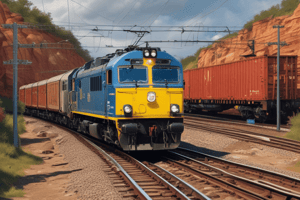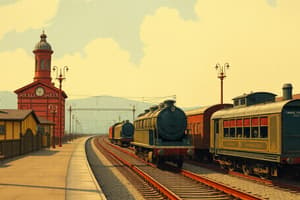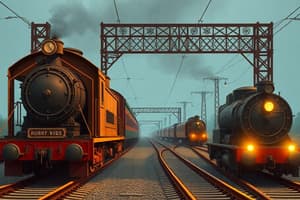Podcast
Questions and Answers
What is the primary purpose of constructing sidings?
What is the primary purpose of constructing sidings?
- To serve as storage areas for railway equipment
- To provide recreational areas for railway staff
- To create additional parking spaces for train locomotives
- To offer door-to-door service and compete with road transport (correct)
Which type of siding has its construction and maintenance costs covered entirely by the Military department?
Which type of siding has its construction and maintenance costs covered entirely by the Military department?
- Assisted Siding
- Military Siding (correct)
- Private Siding
- Special Siding
What is a key characteristic of private sidings regarding their construction and upkeep?
What is a key characteristic of private sidings regarding their construction and upkeep?
- Costs are shared equally between private parties and the railway.
- Railways handle all construction and maintenance costs.
- The government bears the cost of construction, and the private party handles maintenance.
- The private party is responsible for both construction and maintenance expenses. (correct)
If a private siding owner wants to permit another party to use their siding, how many working days should they inform the relevant Zonal Railway in advance?
If a private siding owner wants to permit another party to use their siding, how many working days should they inform the relevant Zonal Railway in advance?
What general rule applies concerning the leasing or renting of sidings by their owners?
What general rule applies concerning the leasing or renting of sidings by their owners?
Which of the following is NOT a type of coaching train?
Which of the following is NOT a type of coaching train?
A train journey that starts and ends within the same Zonal Railway is best described as:
A train journey that starts and ends within the same Zonal Railway is best described as:
What type of traffic includes passenger trains such as Rajdhani and Shatabdi?
What type of traffic includes passenger trains such as Rajdhani and Shatabdi?
Which term describes the location where goods are initially booked for transport?
Which term describes the location where goods are initially booked for transport?
A train that neither starts nor ends on a particular Zonal Railway, but passes through it, is considered what type of traffic for that zone?
A train that neither starts nor ends on a particular Zonal Railway, but passes through it, is considered what type of traffic for that zone?
Who is responsible for receiving goods at the designated destination station?
Who is responsible for receiving goods at the designated destination station?
Which traffic type might involve travel through a different Zonal Railway even though its origin and end points are within the same Zonal Railway?
Which traffic type might involve travel through a different Zonal Railway even though its origin and end points are within the same Zonal Railway?
Where are City Booking Offices primarily situated?
Where are City Booking Offices primarily situated?
What is a 'consignment' in the context of railway transport?
What is a 'consignment' in the context of railway transport?
When is freight considered 'Paid Freight'?
When is freight considered 'Paid Freight'?
Which of the following locations uses contractors to handle the traffic?
Which of the following locations uses contractors to handle the traffic?
In the case of 'To Pay Freight', what is typically collected in addition to the freight charges?
In the case of 'To Pay Freight', what is typically collected in addition to the freight charges?
What is an Out Agency primarily designed to facilitate?
What is an Out Agency primarily designed to facilitate?
If payment of freight for general merchandise is late, what late payment charge is levied?
If payment of freight for general merchandise is late, what late payment charge is levied?
Which statement is TRUE regarding additional charges?
Which statement is TRUE regarding additional charges?
Which of the following best describes what is meant by 'Railway Premises'?
Which of the following best describes what is meant by 'Railway Premises'?
Under what condition are siding charges waived for a railway siding?
Under what condition are siding charges waived for a railway siding?
If Railway employees are posted at a siding, who is responsible for their salary?
If Railway employees are posted at a siding, who is responsible for their salary?
What is the primary function of a 'Pooled Wagon'?
What is the primary function of a 'Pooled Wagon'?
How many working days' advance notice is required to permit multiple co-users on a siding?
How many working days' advance notice is required to permit multiple co-users on a siding?
What does the remark 'said to contain' on the Railway Receipt (RR) signify?
What does the remark 'said to contain' on the Railway Receipt (RR) signify?
Which wagons should primarily be used within their owning Zonal Railway?
Which wagons should primarily be used within their owning Zonal Railway?
Where is the delivery of inward rakes typically given when Railway employees are not posted at the siding?
Where is the delivery of inward rakes typically given when Railway employees are not posted at the siding?
What is a key feature of wagons designated for the Engineering Department (ED)?
What is a key feature of wagons designated for the Engineering Department (ED)?
According to the provided information, what should happen to a wagon by the last day of the month printed on it?
According to the provided information, what should happen to a wagon by the last day of the month printed on it?
What type of commodities are typically loaded in a 'WT' (Water Tight) wagon?
What type of commodities are typically loaded in a 'WT' (Water Tight) wagon?
Which of the following is NOT a type of wagon, as mentioned in the provided text?
Which of the following is NOT a type of wagon, as mentioned in the provided text?
According to the Railway Act of 1989, what information concerning the carrying capacity of a wagon must be displayed?
According to the Railway Act of 1989, what information concerning the carrying capacity of a wagon must be displayed?
What does the abbreviation 'FA' stand for with regards to wagons?
What does the abbreviation 'FA' stand for with regards to wagons?
According to the provided information, what does the term 'Working Hours' refer to at a Goods Shed/Siding?
According to the provided information, what does the term 'Working Hours' refer to at a Goods Shed/Siding?
When is the 'Busy Season' for goods traffic according to the text?
When is the 'Busy Season' for goods traffic according to the text?
What is the 'Busy Season Surcharge' on base freight for all commodities (excluding coal & automobile traffic) moved in NMG, BCACM, BCCNR and BCACBM, during the busy season?
What is the 'Busy Season Surcharge' on base freight for all commodities (excluding coal & automobile traffic) moved in NMG, BCACM, BCCNR and BCACBM, during the busy season?
What is the supplementary surcharge for a mini rake traveling between 1001 and 2000 km?
What is the supplementary surcharge for a mini rake traveling between 1001 and 2000 km?
What is the congestion surcharge for all goods traffic booked to Pakistan?
What is the congestion surcharge for all goods traffic booked to Pakistan?
Which commodities are exempt from the Busy Season Charge?
Which commodities are exempt from the Busy Season Charge?
What is the development charge levied on the Normal Tariff Rate (NTR)?
What is the development charge levied on the Normal Tariff Rate (NTR)?
According to the provided information, what does the Normal Tariff Rate (NTR) include?
According to the provided information, what does the Normal Tariff Rate (NTR) include?
What is the supplementary surcharge for a multipoint rake during the busy season?
What is the supplementary surcharge for a multipoint rake during the busy season?
According to the provided content, which IRCA book would you consult for general classification of goods?
According to the provided content, which IRCA book would you consult for general classification of goods?
What is the supplementary surcharge for a two-point rake throughout the year?
What is the supplementary surcharge for a two-point rake throughout the year?
Flashcards
Rail Traffic
Rail Traffic
The traffic transported by trains, including goods and passengers.
Goods Traffic
Goods Traffic
Goods transported by trains.
Coaching Traffic
Coaching Traffic
Traffic transported by passenger trains, including ordinary, express, super-fast, and more.
Forwarding Station
Forwarding Station
Signup and view all the flashcards
Destination Station
Destination Station
Signup and view all the flashcards
Consignor
Consignor
Signup and view all the flashcards
Consignee
Consignee
Signup and view all the flashcards
Consignment
Consignment
Signup and view all the flashcards
What are sidings?
What are sidings?
Signup and view all the flashcards
What is a Military Siding?
What is a Military Siding?
Signup and view all the flashcards
What is a Private Siding?
What is a Private Siding?
Signup and view all the flashcards
What is an Assisted Siding?
What is an Assisted Siding?
Signup and view all the flashcards
What is a Special Siding?
What is a Special Siding?
Signup and view all the flashcards
Local Traffic
Local Traffic
Signup and view all the flashcards
Foreign Traffic
Foreign Traffic
Signup and view all the flashcards
Through Traffic
Through Traffic
Signup and view all the flashcards
Station
Station
Signup and view all the flashcards
City Booking Office (CBO)
City Booking Office (CBO)
Signup and view all the flashcards
City Booking Agency (CBA)
City Booking Agency (CBA)
Signup and view all the flashcards
Out Agency (OA)
Out Agency (OA)
Signup and view all the flashcards
Out Agency (OA) - Transportation
Out Agency (OA) - Transportation
Signup and view all the flashcards
Siding
Siding
Signup and view all the flashcards
Siding Co-Users
Siding Co-Users
Signup and view all the flashcards
Railway Responsibility for Siding Traffic
Railway Responsibility for Siding Traffic
Signup and view all the flashcards
Siding Shunting
Siding Shunting
Signup and view all the flashcards
Siding Charges
Siding Charges
Signup and view all the flashcards
IBP Siding Charges Waiver
IBP Siding Charges Waiver
Signup and view all the flashcards
Demurrage on Sidings
Demurrage on Sidings
Signup and view all the flashcards
Railway Employees at Sidings
Railway Employees at Sidings
Signup and view all the flashcards
Water Tight (WT) Wagon
Water Tight (WT) Wagon
Signup and view all the flashcards
Non Water Tight (NWT) Wagon
Non Water Tight (NWT) Wagon
Signup and view all the flashcards
Carrying Capacity
Carrying Capacity
Signup and view all the flashcards
Floor Area (FA)
Floor Area (FA)
Signup and view all the flashcards
Tare Weight
Tare Weight
Signup and view all the flashcards
Working Hours
Working Hours
Signup and view all the flashcards
Business Hours
Business Hours
Signup and view all the flashcards
Busy Season (Goods Traffic)
Busy Season (Goods Traffic)
Signup and view all the flashcards
Busy Season Surcharge
Busy Season Surcharge
Signup and view all the flashcards
Congestion Surcharge
Congestion Surcharge
Signup and view all the flashcards
Supplementary Surcharge
Supplementary Surcharge
Signup and view all the flashcards
Normal Tariff Rate (NTR)
Normal Tariff Rate (NTR)
Signup and view all the flashcards
IRCA Goods Tariff Books
IRCA Goods Tariff Books
Signup and view all the flashcards
IRCA Goods Tariff Books: Purpose
IRCA Goods Tariff Books: Purpose
Signup and view all the flashcards
IRCA Goods Tariff Books: Content
IRCA Goods Tariff Books: Content
Signup and view all the flashcards
IRCA Goods Tariff Books: Importance
IRCA Goods Tariff Books: Importance
Signup and view all the flashcards
Study Notes
Rail Traffic Definitions
- Rail Traffic: Traffic transported by trains, encompassing Goods Traffic and Coaching Traffic.
- Goods Traffic: Traffic carried by goods trains, accepted in wagon load or train load.
- Coaching Traffic: Traffic carried by coaching trains (ordinary, express, superfast, Rajdhani, Shatabdi, Janshatabdi, GaribRath, and Parcel trains). Coaching traffic rates are usually higher than goods rates.
- Railway Premises: Includes station buildings, platforms, tracks, goods sheds, godowns, sidings, and other railway property.
Stations and Parties Involved
- Goods Shed: Office where goods traffic is handled.
- Forwarding Station: Station where traffic is booked.
- Destination Station: Station for which traffic is booked.
- Consignor: Party booking goods at forwarding station.
- Consignee: Party receiving goods at destination station.
- Endorsee: Person in whose favor an endorsement is made, but liability remains with consignor/consignee.
- Consignment: A package or group of packages booked under one receipt.
- Paid Freight: Freight paid at the forwarding station. Prepayment of freight is mandatory.
- To Pay Freight: Freight paid at the destination station.
- To Pay Surcharges: Surcharges are added to freight for other traffic types (10% for coal, 5% for other traffic) and for late payment.
- Late payment charge: 5% late payment charge is applied on the freight for general merchandise if paid after the expiry of scheduled time, and 10% for coal.
Traffic Types
- Local Traffic: Traffic originating and terminating at stations on the same zonal railway.
- Foreign Traffic: Traffic originating at one zonal railway and terminating at another.
- Through Traffic: Traffic neither originating nor terminating on a particular zonal railway but passing through it.
- Coaching Trains: Trains used for passenger transport (ordinary, mail, express, Rajdhani, Shatabdi, GaribRath, Janshatabdi, parcel, and mixed).
- Goods Trains: Trains used to transport goods.
Offices and Agencies
- City Booking Office (CBO): Offices in major cities handling ticket and luggage/parcel bookings for passengers. Charges are same at station except for luggage and parcels.
- City Booking Agency (CBA): Equivalent to CBO with functions performed by contracted staff.
- Out Agency (OA): Facilitates rail traffic from industrial areas where no rail line exists. Goods transported through OA have extra charges levied.
- Sidings: Branch lines extending from the main line to industrial areas.
Siding Objectives, Types, and Rules
- Siding objectives: Provide door-to-door service, compete with road transport.
- Military Siding: Used for military traffic; maintenance & expenses by Military Dept.
- Private Siding: Belong to private parties; expenses borne by owners. They can allow co-users and inform the concerned Zonal Railway in advance.
- Assisted Siding: Railways contribute to the cost of Siding construction.
- Special Siding: Railways own the siding and any party can book goods.
- General Siding Rules: Publish siding list, restricted to specific goods, no lease or rent to other parties, Railways responsible for section 94 of Railway Act 1989, shunt goods and collect charges, consider through-distances, normal demurrage applies, and siding salary debited to owner when railway employees present.
Wagon Types and Information
- Pooled Wagons: Can be dispatched to any zonal railway.
- Non-Pooled Wagons: Used only within the owning zonal railway.
- Wagon Number: Printed on each wagon.
- Owning Railway: Printed on wagon.
- Engineering Department (ED): Handles wagon material transport.
- Date of return (R): Printed on each wagon, showing when it should return to the workshop.
- Water Tight (WT): Wagons where commodities vulnerable to damage from wetness are loaded.
- Non-Water Tight (NWT): Wagons not suitable for damp goods.
- Types of wagons: Covered (BCX, BCN, etc.), Open (BOXN, BOXY, etc.), Hopper (BOBY, BOBYN, etc.), Tank (TP, TK, etc.), Flat, and others.
- Carrying capacity [Floor Area (FA)]: Stated on each wagon.
- Tare Weight: Weight of empty wagon.
Working Hours and Business Hours
- Working Hours: Time dedicated to loading and unloading goods.
- Business Hours: Time during which goods are accepted, booked, delivered at Good Shed. Normal Business hours are from 6 to 22 hours, extendable on consideration.
- Busy Season/Lean Season: Goods traffic busy season is from Oct 1 to June 30, and lean season from July 1 to September 30. Corresponding surcharges apply.
Surcharges and Rates
- Busy Season Surcharges: Surcharge on base freight rate for specific commodities during busy season (Oct 1 to June 30).
- Congestion Surcharges: Surcharges levied on base freight rate depending on the destination point, the traffic's nature, etc.
- Supplementary Surcharges: additional charge for mini, two-point or multi-point rake traffic.
Published IRCA Books
- IRCA Goods tariff books: Contain rules, transportation of goods/livestock, general rules of delivery, classification of goods, freight tariffs, dangerous/explosive goods, military goods transport rules, and information about stations.
Studying That Suits You
Use AI to generate personalized quizzes and flashcards to suit your learning preferences.
Related Documents
Description
Test your knowledge on railway operations, sidings, and specific types of train services. This quiz covers key concepts such as private sidings, coaching trains, and traffic types within Zonal Railways. Challenge yourself with questions about regulations and operational practices in the railway sector.




